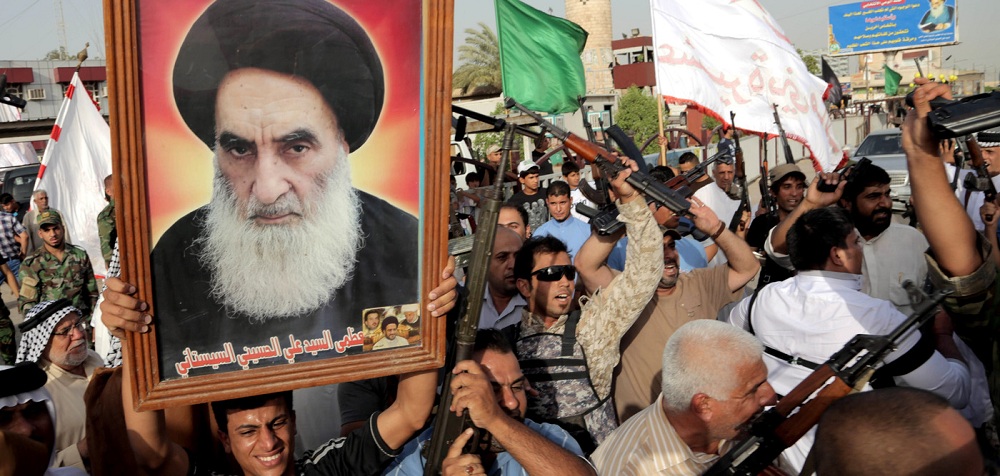Alwaght- Iraq is still grappling with anti-government protests that were resumed on October 25, proving that the efforts made by the politicians to contain them have so far gone nowhere. The economic and political reform packages have not persuaded the people to return home. Last week, Prime Minister Adel Abdul Mahdi told the two leading parliamentary alliances Fatah and Saeroon to agree on a new PM as he lost a major portion of his support offered by major actors in the parliament. Still, there is no clear outlook about an agreement, meaning his premiership remains in a state of ambiguity.
From another aspect, the government recognizes the people’s right to demonstrate in the capital Baghdad and the majorly Shiite cities in the south against unemployment, poor public services, and corruption. But the security forces unavoidably need to show an iron fist in the face of part of the protestors who fuel violence. This automatically radicalizes the atmosphere of the demonstrations on the one hand and gives the foreign media propaganda material to stoke up the crisis on the other hand. According to the Iraqi High Commission for Human Rights, since the start of the protests on October 1 until October 8, at least 283 people have been killed and over 13,000 injured. These figures include the protestors and security forces.
In such a tumultuous situation, focusing on the statements made by top Shiite cleric Ayatollah Sayyed Ali al-Sistani, who recognizes the people’s rights to hold protests, recommends the government not to resort to force in dealing with the demonstrations, and emphasizes on the need to prevent foreign meddling to avoid hijacking of the protest and demands makes it clear that the Shiite clergy can work as a contact line between the protestors and government and build a ground to solve the crisis. The Grand Ayatollah was over the past month has tried to represent the popular demands and be a bridge between the people and the government.
People are separate from rioters and opportunists
Over the past years, Iraq has been a scene to complicated home and foreign plots targeting its stability, territorial integrity, domestic cohesion, and national independence. In the recent demonstrations too, there have been reports about the presence of agents with affiliation to foreign intelligence agencies, mainly those of the United Arab Emirates and the Israeli regime, all to affect the course of developments. Turkish President Recept Tayyip Erdogan during his trip to Hungary this week commented on the issue noting that some foreign parties are behind the Iraq's protests.
This reality may encourage some Iraqi politicians to disregard the protests and problems and even show poor performance in the fight against corruption. But Ayatollah Sistani brings under concentration the two issues. While in the latest statement he advocated the popular right to protest, he warned that some sides and agents in the demonstrations hurt people and even tortured them and they are seeking anew to exploit the fresh demonstrations for their own goals.
Preventing political impasse
While the statement confirms that people are right in their demands for a change, it supports the government in its moves towards reforms to realize the popular demands. This stance very importantly closes the door to any possible impasse that will bring nothing but deteriorated conditions for the country.
“The political forces have an exceptional opportunity to respond to the people’s demands based on the generally agreed-upon roadmap. Using this opportunity should not be delayed because it will expose the country to big dangers,” part of the statement read.
In a statement, Abdul Mahdi welcomed the guidance offered by the grand Shiite cleric, adding that “our people, both civilians and military personnel have demonstrated to welcome the blessed guidance especially that it provides a precious chance that should not be wasted.”
Frustrating conspiracies against PMF
One key drive behind the foreign intervention in the Iraqi crisis is to damage the credibility of the Popular Mobilization Forces (PMF) -- a military force founded by a fatwa of Ayatollah Sistani in 2014 to battle ISIS terrorist group-- in the eyes of the Iraqi public. Since last year, the Iraqi government underwent heavy pressures by the US to dissolve the key counterterrorism force. But to Washington’s frustration, Baghdad defiantly declined to yield to the pressures. Next-level anti-PMF measures were attacks carried out by the Israeli drones on the voluntary force’s positions. The PMF was a thorn in the side of the US as the Americans struggled for long-term ISIS stay in Iraq.
As the protests expanded, Ayatollah Sistani’s office on November 1 issued a statement to Karbala Friday prayer cautioning against a violent confrontation between the security forces and protestors. Following the statement, the foreign media unleashed a heavy wave of anti-PMF propaganda interpreting the statement as an opposition of the top cleric to PMF, also known as Hashd al-Shabi in Arabic. But the latest statement delivered the reverse, frustrating those seeking a propagandistic campaign against the Hashd.
The new statement read: “Our dears in the armed forces and those who fought ISIS terrorism in defense of the nation, the holy sites, and our territories have a big right upon every one of us. We should not forget their sacrifices and they should not hear a word questioning their big sacrifices.” These stances come by the top Shiite cleric while some regional and international media seek to blame the PMF for the death of protestors.



























